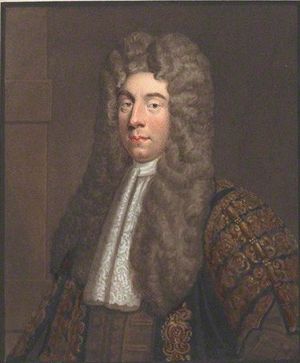2nd Parliament of Great Britain facts for kids
Quick facts for kids 2nd Parliament of Great Britain |
|||||
|---|---|---|---|---|---|
|
|||||

Richard Onslow, Speaker of the House of Commons
|
|||||
| Overview | |||||
| Term | 8 July 1708 – 21 April 1710 | ||||
| House of Commons | |||||
| Members | 558 MPs | ||||
| Speaker of the House of Commons | Richard Onslow | ||||
| House of Lords | |||||
| Lord Keeper of the Great Seal | William Cowper | ||||
| Sessions | |||||
|
|||||
The 2nd Parliament of Great Britain was a very important group of lawmakers. It was the first time people actually voted for their representatives in Great Britain! The 1st Parliament of Great Britain had been formed from older English and Scottish Parliaments.
Queen Anne called for this new Parliament on April 26, 1708. People voted for members of the House of Commons of Great Britain between April and July 1708. The Parliament officially started meeting on July 8, 1708. It was supposed to last for three years, but it was ended early on September 21, 1710.
Contents
Who Were the Members of Parliament?
The 2nd Parliament of Great Britain had 558 members. These members were chosen from different areas across England, Wales, and Scotland.
How Many Members Represented Each Country?
- England had 486 members.
- Wales had 27 members.
- Scotland had 45 members.
What Were the Main Political Groups?
At this time, there were two main political groups:
These groups often had different ideas about how the country should be run.
Important Leaders and Government Roles
This Parliament had key leaders who helped make decisions for Great Britain.
The Speaker of the House of Commons
On November 16, 1708, Sir Richard Onslow was chosen as the Speaker. He was a Whig member from Surrey. The Speaker's job is to lead meetings in the House of Commons. They make sure everyone follows the rules.
The Most Powerful Minister
Back then, there wasn't a "Prime Minister" like we have today. The most powerful person in the government was the Lord High Treasurer. This person was in charge of the country's money.
- Sidney Godolphin was the Lord High Treasurer. He was a Tory.
- His government included both Tories and Whigs. They were called the 'Court Party'.
- Their main goal was to support the armies fighting in the War of the Spanish Succession in Europe. Godolphin's money skills were very important for this.
Changes in Government Leadership
In August 1710, Queen Anne decided to change the government completely. She removed Godolphin and his friends from their jobs.
- A new government was formed. It included Tories led by Robert Harley and Henry St John.
- On August 10, 1710, the job of Lord High Treasurer was split among several people.
- John Poulett, 1st Earl Poulett became the First Lord of the Treasury.
- Robert Harley became the Chancellor of the Exchequer, which meant he was in charge of the country's money.
Soon after these new leaders took over, they arranged for the Parliament to be ended.
Important Laws Passed by Parliament
During its time, the 2nd Parliament passed many important laws, also known as Acts. Here are a few examples:
- Bank of England Act 1708: This law was about the Bank of England.
- Diplomatic Privileges Act 1708: This law dealt with special rights for diplomats from other countries.
- Foreign Protestants Naturalization Act 1708: This law made it easier for Protestants from other countries to become British citizens.
- Copyright Act 1709: This was a very important law that protected the rights of authors and creators. It was one of the first modern copyright laws.
- Eddystone Lighthouse Act 1709: This law was about the famous lighthouse at Eddystone.
- Landlord and Tenant Act 1709: This law set rules for people who rented land or homes.
- Post Office (Revenues) Act 1710: This law was about how the Post Office collected money.
See also
- 1708 British general election
- List of MPs elected in the British general election, 1708
- Godolphin–Marlborough ministry 1702-1710
- List of parliaments of Great Britain
| Preceded by 1st Parliament of Great Britain |
2nd Parliament of Great Britain 1708–1710 |
Succeeded by 3rd Parliament of Great Britain |
 | Bayard Rustin |
 | Jeannette Carter |
 | Jeremiah A. Brown |

